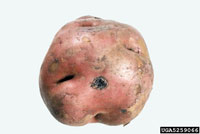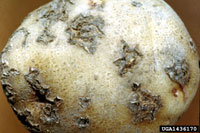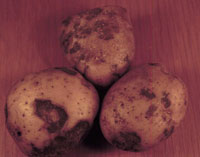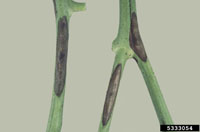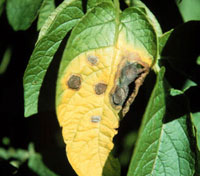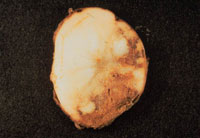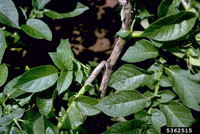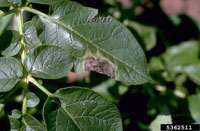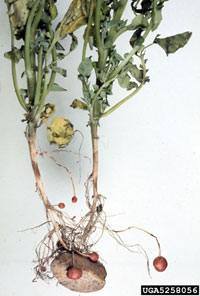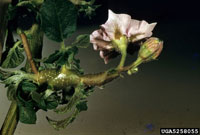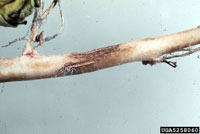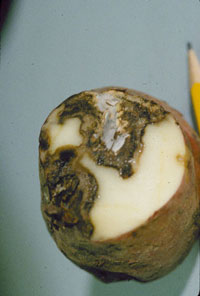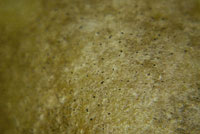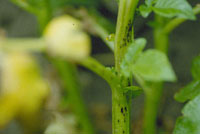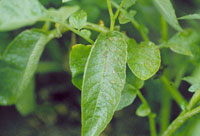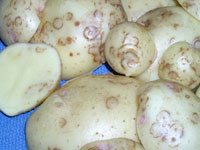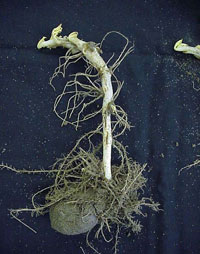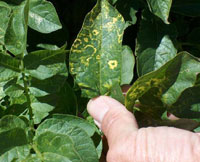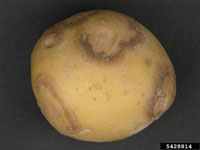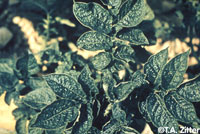Extension > Garden > Diagnose a problem > What's wrong with my plant? > Vegetable > Potato > Spots on tuber
Potato > Tuber > Spots on tuber
1 of 8
Common Scab
Streptomyces spp.
- Round rough, brown spots on tuber surface
- Spots may be slightly raised and rough or slightly sunken depending on cultivar
- Disease only affects tubers
- Disease is favored by alkaline and dry soils
- More information on Common Scab
2 of 8
Early Blight
Alternaria solani
- Potato tubers develop dark, sunken spots surrounded by a purplish brown raised border
- Rough, corky dry tissue can be seen below tuber spots when cut open
- Leaf spots are round, brown with target like rings inside
- When severe many leaf spots grow together resulting in large brown patches and leaves turn yellow
- Stem lesions are dark, slightly sunken areas
- More prevalent in warm and humid weather
- More information on managing plant diseases in the home garden
3 of 8
Late Blight
Phytophthora infestans
- Irregular sunken, dull brown to purple lesions around the eyes on potato tubers
- Inside of potato tuber has a reddish-brown dry rot
- Large irregular olive to brown leaf spots that are not restricted by leaf veins
- In wet weather, leaves, stems and petioles rapidly turn brown and shrivel
- Powdery white fungal growth can be seen on infected tissue in wet weather
- More prevalent in years of cool and wet weather
- More information on managing plant diseases in the home garden
4 of 8
Black Scurf/Rhizoctonia Canker
Rhizoctonia solani
- Small hard black spots stick to the skin of the tuber like dirt that won't wash off
- Delayed or no emergence, have few stems, and poor growth
- Underground stems and roots have brown, sunken dry spots
- Tuber production is low, tubers may be small and deformed
- In severe cases, small green tubers form on the stem above ground
- Stem has a white to gray flaky growth just above the soil line.
- Most problematic in cool wet soils
- More information on Black Scurf/Rhizoctonia Canker
5 of 8
Fusarium Dry Rot
Fusarium sp.
- Tuber surface has sunken dark spots, eventually becoming wrinkled in concentric rings
- In storage, tuber develops a dry decayed cavity often with white fluffy fungal growth or pink to yellow spores inside
- Plant may not emerge, or may emerge small and weak
- More information on Fusarium Dry Rot
6 of 8
Black Dot
Colletotrichum coccodes
- Irregular patches of gray discoloration on surface of the potato tuber
- Sunken dark brown to black lesion on stem that turns white in the center with age
- Many pinprick sized black dots can be seen on infected stems and tubers (handlens is helpful)
- Leaves may have random brown spots, or may yellow and wilt due to infection of stem and roots
- More information on Black Dot
7 of 8
Corky Ring Spot
Tobacco Rattle Virus
- Potato tubers can be cracked and malformed if infections comes in early
- Brown rings and arcs form on the skin and in the flesh of tubers
- Leaves may have no symptoms or have yellow rings, spots and arcs
- Stems may be mottled green and yellow
- More information on Corky Ring Spot
8 of 8
Potato Virus Y (PVY)
- In severe cases, light brown rings form on tuber skin
- Leaf symptoms vary greatly depending on strain of virus present
- Light and dark green mosaic pattern on leaves, occasionally leaves crinkle
- More information on Potato Virus Y (PVY)



